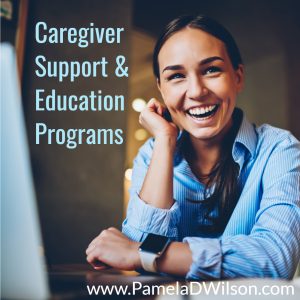Are you a caregiver who wants to move ahead with your life? Are you afraid to discuss what you want because you know others might disagree or have different expectations?
In this week’s episode #179, How to Stop Avoiding and Start Living, and the accompanying webinar, How to Create Stability During Uncertain Times, learn why caregivers avoid difficult discussions and hesitate to make choices when life seems uncertain.
Learning to advocate and speak up for your beliefs is essential if you want more control over your life and destiny. Caregivers also have many questions about how the actions of healthcare systems and government policies affect caregivers and care receivers.
Tips in this podcast and associated webinar will help caregivers learn how to:
- Identify internal and external environment gaps so you are inspired and uplifted
- Create energy to move ahead to do more of what you want
- Gain momentum and see progress each week
- Make your mind your friend to avoid being caught up in worry or drama
- Question systems and data that might limit or eliminate consumer choice
Effects of Environment on Caregiver Activities
Let’s start with how a caregiver’s energy levels and environment can create roadblocks. Your mind, thoughts, actions, and behaviors create the internal energy that fuels your life.
Much like a car needs gasoline to run, your body needs fuel and energy to get through each day. This fuel can be emotional, intellectual, or physical—like the things you eat and drink—and the thoughts and information you come across.
This fuel to create energy and progress in your life comes from your actions and the level of responsibility you accept to forge your life path and create opportunities for yourself. As a caregiver, these actions relate to where and how you choose to spend your time. These efforts relate to investments in self-improvement or self-care.

Caregivers don’t like to use the word self-care because there can be a belief that self-care is being self-ish. Self-improvement and self-care are not self-ish.
These self-directed activities fuel the momentum that builds your ability to have the energy to be independent and take care of other people.
Self-care through personal development and education can make you good at your job so that you can earn an income to support yourself or your family and have more life experiences.
Limitations
The same self-directed activities apply to learning the skills necessary to be a good caregiver. There are a lot of skills that caregivers need.
Caregivers must learn about health, how to interact with healthcare system providers, how to manage money and the financial aspects of paying for care, the legal aspects of medical and financial power of attorney, and the importance of having a living will and a will.
Unfortunately, this information is not taught in school to prepare individuals for life. Gaining a variety of life skills helps caregivers navigate uncharted territory.
Self-care and survival instincts begin at birth. Children learn to stand on two feet, walk, talk, and eat. Babies and children see possibilities.
They don’t know they can’t do things until someone tells them they can’t. The more you advance in life, the more you might be in situations where others tell you this or that isn’t possible. You may begin to identify the extent to which others have the power to direct your choices and thoughts.
I remember a grade school teacher who told me there were no blue houses when I created a drawing of a house and colored it blue. Since my grade school days, I’ve seen plenty of blue houses.
Information and Opinions
While I listen to people who tell me things are impossible, I take the information at face value and investigate it for the accuracy or underlying motivation.
Information shared is founded on other people’s beliefs, life experiences, and research, which can be very helpful. It is essential to identify the context and background of the information presented. Leaving out background information or details—intentionally or unintentionally—can result in confusion or misleading information.

If you have life experience, you might know that receiving bits and pieces of information, while accurate in isolation, may not tell you the big picture or everything you need to know to make a good decision.
Receiving information in this manner is kind of like eavesdropping on a conversation without knowing all of the details. You can easily be led to think one way when the opposite may be accurate.
If you want to stop avoiding and start living life — understanding context and validating information is a practical skill to pursue.
The risk of not validating information is receiving a recommendation from someone you act upon. The recommendation does not turn out as you expected, and you may be disappointed or angry.
Why? Because the person who made the recommendation did not have the experience to see all of the potential consequences, may have accepted information from someone else at face value, or did not thoroughly understand the complexity of your situation.
Collecting, evaluating, and verifying information is necessary to make good decisions. Look at the context of every situation. Your life is different from the life of another person. What works for them may not work for you. Their beliefs, culture, and family situations may be different from yours.
Family and peer pressure
You are responsible for receiving, researching, and validating information and then making choices— even if that choice is to break away from what everyone else is doing or thinks you should do.
If you have ever had to make a difficult decision, you know it is easy to be influenced by family members, social groups, or peer pressure. The exterior environment—the impact of other people and the places where people spend time—can frame or limit decisions and actions.

Your exterior environment includes your family, friends, workplace, and social groups. The thoughts, actions, and behaviors of the people you spend time with can be influential.
If you want your life to be different, changing how you think and who you spend the most time with can have a positive impact.
So, if you feel stuck, take an in-depth look at your internal and external environment and how you invest in yourself through self-improvement and self-care. You make life happen. No one else can do this for you.
Create Energy: Identify What You Want From Life
Ask the question, what do you want from life? If you can’t answer this question, give this question serious thought.
The best way to start living your life is to be 1000% clear about what you want and take daily steps to get you there. If you are unclear about what you want, here are two questions that might help:
- Do you watch other people and wish you were in their place? If so, what do you feel you are missing out on that you want?
- Do you experience daily challenges? Are your actions contributing to the challenges, or are outside circumstances impacting your life? If what you want is the opposite of these experiences, describe the situation in writing so that you can identify an alternate experience.
Identify the problem and the contrast
For example, create a list of opposites:
- Instead of feeling exhausted, you want to feel energetic.
- Instead of feeling depressed, you want to feel happy.
- Instead of constantly disagreeing with the person, you want to be with positive and uplifting people.
- Instead of being isolated, you want to be socially active.
- Instead of relying on others for money, you want to be financially independent.
There are times when life can be full of battle energy. Caregivers can become worn down from battling with others who don’t have the same goals. If so, you may want to find a new support group or tribe of people with similar goals so you can live with the energy you want to create.
How do you do this? Let’s say there is a quality you want. For example, I want to be happy. Create a picture of what makes you happy and take the steps to bring happiness into your life.
Spend time with happy people. Participate in activities that make you happy.
Examples of common wants
If you’re still unsure about what you want, here are a few examples:
- Stable employment
- Friends who have common interests
- A reliable car
- A good marriage and a life partner
- Fulfilling activities
- A safe home
Once you know what you want and how this looks, write up a detailed plan for self-improvement and self-care activities. This plan will help you stop avoiding and start living.
Stop Avoiding and Start Living
Once you plan to accomplish what you want, take steps every day to move forward. Check each week to confirm progress toward creating your desired experience.
If you are making progress, your internal and external environments match up. If you know what you want and it’s not happening, there may be a gap between your internal and external environments.

Maybe your mind thinks one thing. However, your daily actions are contradictory.
Let’s say you want kind people in your life, but your behaviors are rude and unforgiving. If you want something, you must act “as if” to create the experience you want through daily actions.
If your thoughts and behaviors don’t match up, do aspects of your external environment result in contradictory behaviors? If so, you may have to be more intentional with your thoughts and actions.
For example:
- If you seek stability, build relationships with stable people.
- If you want peace, minimize or eliminate the time you spend with people who try to draw you into drama or trauma.
- If you want to stop drinking, don’t go to bars or put yourself in stressful situations that may make you want to drink.
While you don’t have to eliminate people from your life, you can limit the time you spend with people who take you physically, mentally, or emotionally away from what you want in your life.
These detractors include those you care for who may be critical or negative. Some caregiving relationships can be physically and emotionally draining for the caregiver and care receiver.
Close Gaps Between Thoughts and Actions
Depending on your situation, you may need to limit your time and find other options for caring for an aging parent. If you are a spouse, you may need time away from the situation to avoid burnout and exhaustion.
The person you care for may appreciate having other people in their life. Care relationships with few outside relationships can be limiting in many ways. For example, a lack of exposure to life events, the perspectives, and life experiences of other people.
There are many reasons that caregivers stay in toxic or difficult situations longer than necessary. This often occurs because caregivers don’t know how to make a plan or believe there are no other options. In addition, caregivers become stuck due to:
- Belief about duty and responsibility
- Concern about abandoning a parent
- Desire for approval or love
- Lack of self-esteem and confidence
- Co-dependent behaviors
If these or other reasons tie you to a caregiving relationship, what are the effects of these beliefs? Do they support a positive and balanced relationship? If not, consider that you and the person you care for deserve more.
Caregivers can become distracted and unintentionally abusive when they stay in challenging situations. You might forget to give a parent medication, schedule a doctor appointment, or do something else that, if not done, can harm your loved one.
Translate being in a bad caregiving relationship to a bad workplace situation. If you are stuck in a dead-end job even though you like the people you work with, your co-workers don’t pay your bills or live your life. Look for a position that is more in line with your desires.
Similarly, if you are a caregiver, your friends or other people who tell you to stay in a difficult situation don’t live your life. If they are insistent about what should be done, ask them how they will help.
If you hate your caregiving situation, job, or other parts of your life, it’s time for a change. Create a transition plan long before it is necessary to stop avoiding and start living.
Find Inspiration
If you feel stuck, identify what is holding you back. Roadblocks can relate to fear, being too comfortable, or adverse life experiences that can hold you back
If you feel lost and need inspiration, find it. Talk with people you know, watch or read the stories of people who have succeeded despite difficult life situations or environments so that you begin to believe that anything is possible.

If you enjoy inspirational and motivational movies, watch Good Will Hunting, Moneyball, Dead Poets Society, Wonder Woman, and Helen Keller’s story in The Miracle Worker.
Achieving success to stop avoiding and start living depends on the importance of what you want and your commitment level to make it happen.
For example, if you are in a caregiving situation that takes more and more of your time, will you:
- Investigate options for the person you care for that decrease your caregiving time.
- Present this information knowing the person you care for may disagree.
- Commit to work on your plan.
- Allow the care receiver to take responsibility for arranging care with the options you provided or to refuse care.
Closing one door and opening another can be unsettling but rewarding when you arrive at your new destination.
Gain Momentum
Creating a shift in any area of life requires focus and combined efforts. Gain momentum and create energy to move ahead by questioning beliefs, reviewing your internal and external environments, evaluating information, and making your mind your friend.
Self-care and self-improvement become non-negotiable when you take responsibility for creating the energy in your life to deliver momentum. The longer you neglect pursuing what you want from life—because you feel responsible for or obligated to another person—the longer you will remain stuck and the more frustrated you might feel.
Everyone has reasons for avoiding change and conflict. Be the person who jumps tall buildings, breaks through barriers, and changes beliefs to bring good things and blessings into your life.
Striking out into new territory can be scary if you grew up or are currently in an external environment that tells you to be like everyone else. If this is where you are, think about the person or people in control of the environment.
- Do their goals match yours?
- How are they similar or different from you?
- Do they live by the same rules?
- Is there an equal give-and-take relationship?
Ordinary people with energy, passion, and commitment accomplish great things. Others remain prisoners of their environments because they do not believe in choice or possibility.
You have the power, the energy, and the fuel to change your belief systems and your life.
Place Responsibility Where It Belongs
As a caregiver, remind others of their responsibilities instead of taking on too much. Personal responsibility means accepting responsibility for your life—the good and the bad.
In balanced relationships, there is no room for blame and no need to fix other people or solve their problems. Not rescuing, changing, or fixing can be difficult for helpful people.

Instead of taking on another person’s responsibilities, remind them they have the skills and abilities to help themselves. These actions encourage others to level up rather than place limits on their abilities.
Sometimes, saying no to a request for help can be the best thing you can do for another person—even though saying no might not feel good. Unintended consequences can result from the best of intentions.
Unintended Consequences
When caregivers take over responsibilities for an aging parent or a spouse, what do you think can happen?
The person who no longer has to do X or Y stops doing these things and becomes more dependent on the caregiver. While a desire to be helpful can have many positive aspects, taking away another person’s responsibilities, abilities, and self-confidence can have far-reaching impacts. People who are not encouraged can become discouraged and feel helpless and hopeless.
The actions of the caregiver set the expectations of care receivers. Unfortunately, when the caregiver wants to change the level of their involvement, the care receiver can be shocked or upset.
- If there were no conversations about the support situation being temporary, the caregiver’s actions may have led the person to believe that this was a forever situation.
- When options, plans, or choices are not regularly discussed between caregivers and care receivers, the assumption is usually that everything is okay.
- Avoiding discussions happens when caregivers want to avoid conflict.
As a result, life runs on auto-pilot until one day, a crash occurs to shake up life.
Assumed Consent
This type of assumed consent, a person agreeing to caregiving responsibilities, can also be related to government policy specific to the U.S. health insurance system. A lack of education about preventative health, healthcare, financial planning, or consumer advocacy education in classrooms makes it difficult for consumers to understand and advocate for needs.

For example, if you are an employee, you might have employer-sponsored health insurance. Companies usually offer a choice between plan A or B.
So why spend time learning about health insurance or how it works until you are sick and have to see the doctor, or someone you care for has to see the doctor?
The healthcare system in the United States is one of the most expensive in the world. Research confirms a lack of progress toward improving health.
Why might this be? If you are healthy and uninvolved with how the health care system works, this might be an impossible question to answer. On the other hand, if you are a caregiver for an aging parent, spouse, or person who needs care, you may have formed opinions based on the ease or difficulty of getting care.
Limited Options Limit Self-Empowerment
The healthcare system in the United States is one of the most expensive in the world in part because corporations don’t make money when people are healthy.
The
Peter G Peterson Foundation confirms that the U.S. spends twice as much on healthcare and achieves poorer health results than other countries.

The United States has a healthcare system that prioritizes treatment for sick people. The system can also limit access to preventative and regular care services and treatments when these actions negatively impact profits or results.
For example, a
report by the Kaiser Family Foundation confirms treatment denials for participants in Medicare Advantage plans.
Let’s take this one step further to look at beliefs about Medicare and its origins.
Many individuals assume that Medicare pays for all health-related care when one is over 65.
This belief is not accurate and shocks many older adults and their caregivers.
On July 30, 1965, President Lyndon B. Johnson signed the Medicare and Medicaid Act, also known as the Social Security Amendments of 1965, into law. The Act established Medicare, a health insurance program for older people, and Medicaid, a health insurance program for people with limited income.
Your belief may have been that Medicare was established for persons of a certain age with no relationship to income. This lack of understanding stems from a lack of education about health prevention, financial planning, and how to pay for health care after age 65. Unfortunately, most people don’t learn about Medicare until it’s time to register for a plan.
Separate from persons over age 65, research and data confirm that state legislation impacts the ability of individuals to be healthy and more self-sufficient. There are significant gaps in life expectancy and access to healthcare services across the United States.
By looking at a
life expectancy map, you can learn the background for differences in health based on where you live. Jeremy Ney is a researcher who shares data on various topics, including healthcare differences. In 2023, he discussed the details of his life expectancy map in
a podcast interview on Policyviz.
Questions About Control of Health and Health Care
There are many ways to consider the relationship between health, healthcare, and current events in the United States. Here are questions from listeners that lead to more questions.
- Does an uneducated population—who may not graduate from high school, go to college, or be motivated to work—give more control to the government who, creates and funds programs that further limit the ability of people to become financially self-sufficient?
- Do payments with specific qualifiers, like disability, become demotivational instead of motivational concerning the ability to seek work and independence?
- Do government programs decrease self-esteem instead of self-confidence?
The answer to this question might be answered by where power resides.
- Is the preference today power for the government or power for the people?
- What are the unintended consequences of government programs on the general population?
- How can programs be designed and tested for greater success before becoming permanent?
What happened
to “that government of the people, by the people, for the people shall not perish from the earth” from Abraham Lincoln’s
speech at Gettysburg on November 19, 1863?
Are government programs taking choices away from the people due to a belief that the government knows better? Here’s another caregiver question:
- Is it better to become better educated and financially self-sufficient and pay for my health care needs instead of relying on the government and Medicare or Medicaid, even if I have to pay for additional costs?
Living Dangerously
To translate these concerns across a wider breadth of experiences, a recent article in National Review titled
“Living Dangerously” by Charles Fain Lehman discusses the mortality, also known as the death rate, in the United States versus other countries.
According to the article, the “biggest gaps (for life expectancy) are not in the elderly but are in the death rates of young and middle-aged adults. Younger people are much less likely to die from medical problems and more likely to die from external causes that include drug overdose, suicide, or excessive substance use. Homicides caused by firearms and car crashes resulting from dangerous driving are the other two causes of higher death rates among young and middle-aged adults in the United States.”
Reading this statement brings up more questions:
- How many of these problems, rising crime, car accidents, drug overdoses, and substance grew worse due to efforts to “defund the police and open the border?”
Fentanyl from other countries is pouring into the United States on our Southern border. Rates of homelessness, crime, and substance use continue to increase.
An article, “
SF Confirms Giving Drugs to Homeless in Hotels,” mentions funding from private interests to separate homeless people with COVID-19 from the general population during the pandemic. While these may seem like logical actions, are they in the long-term best interests of the homeless?
With all of these concerns that result in accidental deaths, where is the urgency by state governments to solve these problems? Or, as some ask, is there a hidden agenda to allow people to self-destruct instead of become contributing members of society who might speak up and disagree with government policies?
More questions:
- Why are people in the United States watching and not speaking up?
- Does a sense of apathy or helplessness exist because the government has been in control for so long that people don’t believe anything they can do will make a difference?

Are we living with a government that wants people to depend on government programs so that people focus on survival instead of advocating for their rights?
While all this is happening, the extremely wealthy—including many politicians—go on with their lives unbothered by the masses, who seem to be destroying their potential by using drugs and committing crimes that have few legal consequences.
Good people are afraid to leave their homes because their communities are unsafe. When will all lives matter?
Increased Pressure On Family Caregivers
Just as there is a place for government support and consideration of unintended consequences, there is a place for caregiver support with similar considerations.
More pressure is being placed on family caregivers to do more and more through policies by the Centers for Medicare and Medicaid and other government agencies that view family members as solutions to rising long-term care costs.
These pressures result in poorer health and financial struggles for family caregivers. Many caregivers turn to substance use or consider suicide.
Family caregivers give up paying jobs to care for loved ones full-time. The result is more individuals who rely on government support.
Might a possible solution be mandating education about preventative health and navigating healthcare, health insurance, legal, financial, and retirement planning? While there is a lot of talk about health literacy, what if there was
more focus on financial literacy?
Finding a Balance Between Avoidance and Life
Is there a balance of government and consumer participation that promotes self-sufficiency and living life— free of too many restrictions and constraints?

Can policies and rules be made by the people who have to live by the rules instead of controlled by politicians and government employees who live under a different healthcare system?
For all these concerns related to caregiving and daily life that might seem out of control or gone too far, a tool to survive can be making your mind your friend instead of your enemy.
Tools To Survive Hopelessness
If you feel helpless, overwhelmed, or overcome by worry, the only way out of this mental spiral is to take action and program your brain to think positive thoughts. Don’t allow the environment and other people to discourage you, especially if you believe in change and want something different.
There is only so much time in every day. If you are a caregiver, you’re probably already overwhelmed. If so, you may be in survival mode. Do what you must do and then make daily time for self-care and self-improvement.
Know that change will happen with or without you. Embrace it. Be open to considering and receiving information to create an unlimited future. Question your beliefs now and then because there may be a better way.
Seek out as much education as possible to make your own decisions. Leave the past in the past. Don’t dwell on past mistakes or poor decisions or allow fear and beliefs to limit your ability to roll with the ups and downs of life.
Put Your Thoughts to Work
Put your positive thoughts to work. Did you know that there is a system of the brain that helps with making your mind your friend? How many of you have heard the term reticular activator?
Simply put, the brain’s reticular activating system regulates behaviors, consciousness, and motivation. A simple example is that you want to learn more about Medicare, Alzheimer’s Disease, or another topic.
Suddenly, you start seeing television commercials, articles on the internet, and other information on this topic. Before yesterday, these topics were unimportant.
How does this happen? It’s simple.
You gave your brain a job to see out this information. Instead of filtering out all of the messages that come to you daily, it’s allowing information specific to Medicare and Alzheimer’s to reach you.
When you start being curious about how to stop avoiding and start living and asking for specific information and support, your brain will search and find this information.
Your reticular activator may be the reason you found this podcast. Your thoughts train your brain where to place its energy and its focus. If you think about a subject, the reticular activator in your brain will go out and find these experiences and create them for you.
Believe and Create
If you believe that people are not helpful. You will find unhelpful people.
So instead, seek out and find what you want in life—good friends, helpful people, job opportunities, a loving family, support as a caregiver, good health, a life filled with peace and happiness. Taking responsibility will help you achieve these things that may not fall into your lap.
And last, as a caregiver or the person who needs care, you will run into roadblocks. There will be people who will challenge your beliefs, dent your confidence, or doubt your abilities.
This can happen in any area of life, so you must prepare. Be prepared with facts and information to overcome the obstacles that appear in your path.

You know your situation and the background of the person you care for better than anyone else. So be careful in allowing others to tell you what to do, especially if your intuition tells you otherwise.
Take time to think through decisions even though having the luxury of time may not always be possible.
If you do your research ahead of time and have to decide in a rush, you are more likely to make a better decision because of the groundwork you have completed.
Being responsible for the care of another person isn’t easy. If you want to stop avoiding and start living, begin the conversations about change, know what you want, make your plan, and work on your plan.
Become an advocate willing to speak up against a healthcare system that can be challenging for consumers and patients to advocate. Be the change you want to see. Create the change you want to experience.
Looking For Help Caring for Elderly Parents? Find the Information, Including Step-by-Step Processes, in Pamela’s Online Program
©2023 Pamela D. Wilson All Rights Reserved